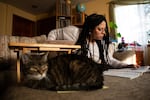
Skyler Brown-Evans checks her voter pamphlet while she fills out her ballot on Thursday, Oct. 24, 2024 in Bend, Ore.
Kathryn Styer Martínez / OPB
Editor’s note: Election Day is Tuesday, Nov. 5. Stay informed with OPB on the presidential race, key congressional battles and other local contests and ballot measures in Oregon and Southwest Washington at opb.org/elections.
Skyler Brown-Evans would climb to the top of Pilot Butte when she was a little girl. She said she would stand on top of the butte and look out over her school, her house and the then-small town of Bend.
“It was really, really freeing. Especially if stuff was tough at school, if kids were being kind of extra mean,” she said, “and then stand there, catch my breath, and then run back down.”
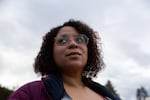
Skyler Brown-Evans stands for a photo in Bend, Ore., just below Pilot Butte on Oct. 17, 2024.
Kathryn Styer Martínez / OPB
Now, 37, Brown-Evans described being bullied in middle and high school because of her race. She’s Black and mixed race. She said growing up, she had to deal with not being white enough, or Black enough for anyone — even some family members.
When, at the National Association of Black Journalists convention in July, Republican presidential nominee and former president Donald Trump questioned Democratic nominee and current vice president Kamala Harris’ identity as a Black woman, Brown-Evans said it struck her to her core.
She said it was the story of her life, but televised. “It is so appalling and offensive that white people feel like they can question your validity in your own community,” she said.
After Latino and Native voting patterns in 2020 caught analysts and pundits by surprise in states once considered safe from swinging — this election is rife with speculations about how certain ethnic and racial blocs will vote.
It’s the third time a Black woman has run for president. The first was Shirley Chisholm in 1972, and Harris is a two-time contender, first running in 2020. But now that Harris is a major party nominee, it hits differently for Black and mixed women.
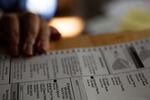
Skyler Brown-Evans votes for Kamala Harris and Janelle Bynum in the 2024 election in Bend, Ore., on Oct. 24, 2024.
Kathryn Styer Martínez / OPB
Related: What you need to know about voting in Oregon and Southwest Washington
When President Joe Biden exited the race, Brown-Evans said it felt “like magic.”

Skyler Brown-Evans drives home after dropping off her ballot in Bend, Ore., on Oct. 24, 2024.
Kathryn Styer Martínez / OPB
As the election nears, she said strangers in Bend have been emboldened to ask her, sometimes at work, about politics and the presidential race.
“Some people will literally look me in the face and say, ‘What do you think about Kamala?’”
Recently, at a bar, Brown-Evans said a white man she didn’t know approached her out of the blue and started asking her questions like, “‘Can I talk to you about politics? Who are you voting for? Well, why would you ever think a Black woman would be the better choice?’” she recalled.
Brown-Evans teaches Black Oregon history and previously worked as a historical interpreter at a local museum. She tried to have a conversation with the man about race and its historical implications in the state.
But when the man told her, “‘No, you don’t know what you’re talking about. I know the Blacks in this town’,” she said, “all I could do is smile, because long ago I decided to stop trying to educate the intoxicated.”

On Oct. 17, 2024 in Bend, Ore., Skyler Brown-Evans shares the frames she drew when she left her husband.
Kathryn Styer Martínez / OPB
Black people in Oregon have been dealing with racism, anti-Blackness, violence, bullying and implicit unwelcomeness for a very long time. Oregon was founded as a whites-only state with Black exclusionary laws. Racist language wasn’t removed from the state constitution until 2002.
Despite being 2.4% of the population, Black Oregonians are the target of almost two-thirds of reported bias crimes in the state.
In Bend this year, a Black member of the city’s human rights and equity commission found the N-word graffitied on the sidewalk outside her home twice. Earlier in the year, people yelled the N-word multiple times at Black city workers and officials during a public meeting.
In 2021, an unarmed 22-year-old Black man, Barry Washington Jr., was killed by a white man with a gun during an argument on a downtown sidewalk, sparking protests against anti-black racism. Five years earlier, a 14-year-old kid, Deshaun Adderley, died by suicide after he was bullied for being Black at Summit High School.
Brown-Evans also attended Summit High School and said she was bullied.
Related: Issues important to Oregon voters
As an adult living in Bend, she works at a downtown bar and as the chair of education for The Father’s Group, a Central Oregon non-profit that supports Black fathers and families.
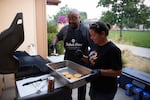
(from left) The Fathers Group co-founders Kelly Musgrove and Natashia James make cheeseburgers at The Fathers Group barbeque in Redmond, Ore., on Sep. 5, 2024.
Kathryn Styer Martínez / OPB
Under the group’s umbrella is Ujima, a program for Black students aged 9 to 18 that provides tutoring, education and a safe space.
Makena Parel, 16, is a junior at Bend-Tech Academy. She has been attending Ujima meetings for about a year.
Parel said Ujima and the Father’s Group helped her connect with Black culture in ways she wasn’t able to before.
“I was really lost for a long time about my identity. So honestly, I think that was the first time that I kind of found a little bit more of myself in that aspect,” Parel said.
She said Brown-Evans is “one of a kind” and has helped her get through “tough times” that involved racism and mental health.
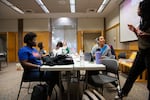
(from left) Danneilla Wilson, Amiyah McGregory and Makena Parel work on homework and chat at an Ujima meeting on Wednesday, Oct. 16, 2024 in Bend, Ore.
Kathryn Styer Martínez / OPB
“I will never ever forget her,” Parel said. “She will always be my auntie Sky, that’s for sure.”
Recently, Parel and her mom went to watch a Bend screening of “Black Girl in Suburbia,” a documentary film by Melissa Lowery.
Lowery, 49, said she was inspired to make the film when her oldest daughter shared that kids in her class were talking about her hair.
“It was the first time my daughter really saw herself being different than everybody else, because of her hair,” Lowery said.
Now living in Hillsboro, Oregon, she remembered growing up about an hour away in a predominantly white community in West Linn. Lowery said the film “talks about what it is like being one of very few in a community.”
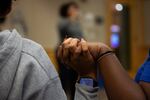
Amiyah McGregory and Danniella Wilson hold hands while Skyler Brown-Evans taslks during an Ujima meeting in Bend, Ore., on Oct. 16, 2024.
Kathryn Styer Martínez / OPB
Things like being the only Black student in class when slavery comes up in a lesson plan and feeling isolated or unsafe to talk about Black issues in school.
“We talk about hair, we talk about dating. It just goes through all of the experiences of what it is to be a young Black girl in suburbia.” Hair is Black girl basics number one, Lowery said.
Black girls and young women nationwide face discrimination because of their hair. In 2021, Oregon joined 26 other states that have passed the CROWN Act, a law prohibiting race-based hair discrimination.
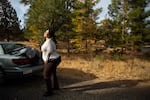
Skyler Brown-Evans shows off her crown after voting for Kamala Harris in Bend, Ore., on Oct. 24, 2024.
Kathryn Styer Martínez / OPB
When Lowery’s daughter came home and shared her experiences of discrimination, she said she wasn’t surprised “but disappointed that they were experiencing the same very similar things that I was 20 years prior.”
Related: Listen to 'OPB Politics Now'
Parel said she liked that the film talked about “how it is being a black girl and it really made me feel not alone.”
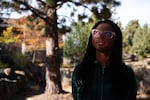
Makena Parel, 16, poses for a photo in Bend, Ore., on Oct., 19, 2024. Parel has been attending Ujima and Fathers Group events for the past year.
Kathryn Styer Martínez / OPB
Parel was shocked to learn that the film was made 10 years ago.
“Oh shizz,” she said, but added, “Obviously, it’s still going on in this world.”
At the end of the screening, Lowery held a Q&A where Parel brought up the issue of white students asking their Black schoolmates for permission to use the N-word.
Lowery has been working in high school education for a decade and she said “the N-word pass” is not a new thing. She sees it most in communities where students of color lack support or equity programs in the community.
She does give the Bend-La Pine school district credit for having an equity program and a Black Family and Student Union, which made the film screening possible.
“I applaud them for having something that is creating programming and support for students,” Lowery said.

Pins available for people to take and wear at a Fathers Group barbeque in Redmond, Ore., on Sept. 5, 2024.
Kathryn Styer Martínez / OPB
Bend-La Pine school district, where Parel and many of the people who attend Ujima go to school, adopted a commitment to equity and anti-racism in 2020. The City of Bend created an equity department in 2021.
Still, racist behavior towards Black children and young people in schools persists.
Brown-Evans said the Father’s Group will go to schools and meet with teachers and administration when they learn about Black students being bullied. This year, she said, they’ve made at least one visit to the Redmond School District and two visits to the Bend-La Pine School District.
“We, as the adults, have to step in and say something,” she said.
At Ujima meetings, she often learns about students being bullied or harassed. At two meetings in a row, a young girl shared that she had been called the N-word again by her white schoolmates.
Brown-Evans soothed her and told her that behavior is wrong. She gave her a sticker that said “I am my ancestors wildest dreams.”
It’s something she tells herself and the young students at Ujima often.
“Not only am I a mixed-race Black woman born in the state capitol of a state that had all the rules against me even being here,” she said, “But I have the opportunity to let my voice be heard. I couldn’t ask for anything more in the world.”
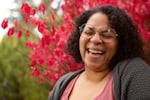
Skyler Brown-Evans stands for a photo in Bend, Ore., on Oct. 17, 2024. Brown-Evans was born in Salem and has lived in Bend for 30 years.
Kathryn Styer Martínez / OPB

Skyler Brown-Evans wears her mother and grandmother's jewelry to vote for the first Black and mixed-race woman on a major party ticket in Bend, Ore., on Oct. 24, 2024.
Kathryn Styer Martínez / OPB
On a sharp October morning, Brown-Evans wore her mother’s silver earrings and her grandmother’s necklace and rings.
She felt excited and nervous.
“I am my ancestor’s wildest dreams,” she said before she filled in the bubble on her ballot, making her presidential pick.

Skyler Brown-Evans fills out her ballot on Thursday Oct., 24, 2024 in Bend, Ore.
Kathryn Styer Martínez / OPB
